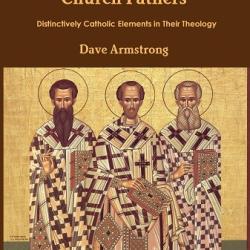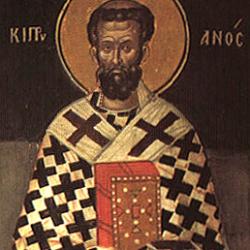* * * * *
*
I appreciate the irenic sentiment. That’s how it was, then, and in many respects or in some places (sadly), still is today. And it is still true in Lutheran circles, too, judging by my recent brief experience on one Lutheran site. Why does it have to be? I would say it is even worse in a sense today, because we should know better by now (and the Catholics of that time were, by and large, no stellar examples of devotion to Christ). We Christians (generally speaking, and particularly on the Internet) have learned little in 500 years about trying to get along and rejoicing in our considerable common ground. But you and I can talk without all that hogwash, for which I am grateful. It is entirely possible.
For example, regarding the opponents he savages in the first several pages of volume 1 (primarily Andrada, for example, who was at the Council of Trent), I would guess that he used them as his typical example of RCC belief because he really believed that they were the only people who had attempted to address the writings of the Lutherans in a substantial way (I wonder if any individuals comparable to the one you held up as a model, namely Francis de Sales, existed during Chemnitz’s time – I’m guessing not).
*
St. Robert Bellarmine would be one. He is the primary opponent of William Whitaker, whose defense of sola Scriptura I have critiqued. Not much of his writing is available in English. Erasmus did a fine job of responding to Luther, in his Hyperaspistes (I have excerpted that at length). By Chemnitz’ time the Catholic Reformation was really starting to kick in (since Trent was part of that).
Further, you must know that from the Lutheran perspective, matters as put forth in the Scriptures are very clear – even if Augustine, for example, did not believe quite the way that we do (this will be addressed later on… still, we would continue to argue that on some critical points – on original sin, for example – he is closer to us than you) – and when others won’t acknowledge the essential truths that we see clearly on display in the Scriptures, it can be highly frustrating. . .
*
I don’t see that Lutherans are unique in this regard. I see Catholic beliefs as rather evident (or at least supported after close examination) in Scripture (if one is presented with the related biblical data), but Protestants disagree. This is true of all belief-systems. We can only present our rationales, and may the truth prevail, by God’s grace, opening up all our so-often-blinded or hopelessly biased eyes!
As for Lutherans seeing things so clearly, I beg to differ. Luther denied free will; the Lutheran Confessions (following Melanchthon) restored it. Luther had a very “high” eucharistic view; Melanchthon did not. The high view seems to have prevailed, confessionally, but maybe not always in practice or with individual Lutherans (just as many individual Catholics deny transubstantiation). Luther had a very high Mariology; Lutherans for the most part have not continued that tradition. Melanchthon wanted the bishops to be restored, rather than a State Church (only a few bishops are present in the various strains of Lutheranism, as I understand it).
Then there were the fights between the Gnesio-Lutherans and Philippists and Crypto-Calvinists. Melanchthon scorned the beliefs of the first group as “bread-worship” even though they clearly followed Luther’s lead. Melanchthon’s soteriology was far closer to Calvinist than Luther’s was (Luther joined sanctification and justification more closely together and even incorporated theosis). Wikipedia (“Gnesio-Lutherans”) also noted that:
. . . there was a “Centrist party”, which included Johannes Brenz, Jakob Andreae, Martin Chemnitz, Nikolaus Selnecker, David Chytraeus, Andreas Musculus, and others.
It also detailed the various inter-Lutheran controversies:
After the death of Luther, many theological controversies arose among the Lutherans, mostly due to teaching of Philip Melanchthon. Gnesio-Lutherans were profiled by defending Martin Luther‘s doctrine, in the beginning led by Matthias Flacius. The Gnesio-Lutherans exercised strict doctrinal discipline, but they also opposed with equal determination the errors of their fellow-combatants like von Amsdorf (Amsdorfians), Flacius (Flacians), Poach, and others. The centres of Gnesio-Lutherans were Magdeburg and the University of Jena.
Gnesio-Lutherans were involved in:
- Adiaphoristic Controversy,
- The Majoristic Controversy (Nicolaus von Amsdorf, Nicolaus Gallus),
- The Second Antinomian Controversy, (Andreas Poach, Anton Otto)
- The Synergistic Controversy (Matthias Flacius, Nicolaus Gallus)
- The Osiandrian Controversy and
- The Crypto-Calvinistic Controversy.
Other Gnesio-Luherans were Caspar Aquila, Joachim Westphal, Johann Wigand, Matthäus Judex, Joachim Mörlin, Tilemann Heshusius, Johann Timann, Simon Musaeus, Erasmus Sarcerius, and Aegidius Hunnius.
Now, of course you’ll say that all this was wrapped up in a pretty bow and resolved once and for all with the Formula of Concord in 1580, but we can see that there was plenty of disagreement among prominent figures. There are still lots of differences today (as in all denominations); for example, concerning disposal of the consecrated elements; when the real presence ceases, the propriety of eucharistic adoration, etc. (things perhaps not specifically covered in the confessions). I cited an article by Arthur Carl Piepkorn in one of my dialogues with Lutherans (at the end) and afterwards summarized its main points:
1) At least according to some Lutherans, “Between the consecration and the reception the elevation and adoration” are “appropriate expressions” of an “awed acknowledgment” of the real presence of the body and blood of Christ. Thus, true adoration of the host (i.e., Jesus) would be permitted during this particular “interim” period in Lutheran worship.
2) The “real presence” may indeed exist in the consecrated elements after the congregation has partaken of Holy Communion. Lutherans cannot be sure one way or the other; thus cannot dogmatically affirm either a more lasting presence or a limited one. Nor can a Lutheran dogmatically affirm or deny that “the sacramental union is a reality before . . . distribution and reception”.
3) #2 being the case, remaining elements must be treated with reverence, and not profanely. Such a “casual profanation” constitutes a greater corruption in our time than the opposite danger of superstition.
4) Even if a Lutheran believes that the real, substantial presence has ceased after reception of Holy Communion, in remaining consecrated elements, he must believe that they did previously bear Christ’s body and blood; thus still requiring the reverent handling and approach referred to in #3.
5) “Luther had grave misgivings about mixing consecrated and unconsecrated elements and insisted that nothing remain after a celebration.” Luther “strenuously differentiated consecrated from unconsecrated elements.”
6) Luther approved of the elevation of the host.
7) Luther appeared to believe in eucharistic adoration, at least during the particular time period in Lutheran worship discussed in #1. Indeed, he thought (much like St. Augustine) that it would be sin to not do this.
8) Following the uncertainties expressed in #2, “formal adoration [in Lutheranism] is neither to be commanded nor forbidden.”
9) Luther believed in “the communion of the sick in their homes with the sacrament consecrated at the parochial celebration.” This implies some lasting period of consecrated elements beyond the usual confines of a formal Lutheran worship service. Luther believed that “the sacramental action (and the sacramental union) cannot be limited to the reception.”
10) “There is no evidence of a change of heart on Luther’s part that would distinguish the ‘young Luther’ from the ‘mature Luther.'”
11) Melanchthon (Luther’s successor) believed in a “more rigid application of the principle that the sacramental presence did not perdure beyond the immediate sacramental action”
12) “[T]he Melanchthonian view and Luther’s view have persisted side by side in Lutheran churches ever since.”
13) Melanchthon’s view on this was more acceptable to John Calvin and closer to his eucharistic theology.
14) The “reverence” towards remaining consecrated elements referred to in #2-5 must not become a “cult of adoration”.
15) “The view that the sacramental union takes place only during the distribution and reception is a pious opinion that Lutherans must tolerate as long as no exclusive claim for its correctness is made.”
But you say, “from the Lutheran perspective, matters as put forth in the Scriptures are very clear.” Well, they are and they aren’t. The Eucharist is both central and essential. In John 6 it is tied directly to salvation and eternal life.
(we must know the Scriptures more, and allow them to deeply form and shape us… Luther was not wrong that their central message and focus was clear, but that presumes seriously listening to and considering what they say – hopefully with the help of a devout Christian).
*
Absolutely. I couldn’t agree more, and am happy to report that our Catholic official statements (notably of Vatican II and many recent papal encyclicals) highly encourage the same.
That said, I am happy to assume the best about you and your intentions: yes, David – we have an honest disagreement.
*
And likewise.
Second, I note that you do tend to think that Chemnitz selectively quotes from Irenaeus and Tertullian, for example (or from everyone really, but I’ll focus mostly on these two): “whereas Chemnitz blithely ignores the massive counter-evidence so that his readers remain utterly ignorant of it”.
*
I’ve found this to be, unfortunately, standard (lay) Protestant practice: cite what seems to fit with one’s view, while ignoring massive patristic data (from the same father) that doesn’t. The same is too often done with Holy Scripture. If only patristic passages about Scripture are cited, while ignoring ones about apostolic succession, bishops, popes, councils, and tradition (in order to get the full picture of what someone thought about the rule of faith), then a false portrayal is set forth, as if a father is proto-Protestant. The Catholic needs merely to produce the other passages that are relevant to the question of authority, and the refutation is rather easy and decisive.
Again, I am a bit sympathetic to your critique. On the other hand…is it possible that he thought that the framework that he had established, i.e. talking about the eight different kinds of traditions – and how the Rule of Faith and the Scriptures went hand in hand (tradition #4) – and how doctrines were more clearly revealed from the Scriptures as heresy challenged and further clarified the Rule of Faith during the years (tradition #5) – could readily explain the omission of all of the quotations you offer from Irenaeus and Tertullian (which you say overthrow his understanding and account)?
*
In charity, yes, it’s possible, but it is still necessary to produce the “non-Scripture” utterances by the fathers on authority, or else a false picture is given. Half-truths are little better than falsehoods. I get the same treatment myself, all the time. For example, I am accused of being “anti-Luther” or of hating Luther (usually by Lutherans, as we would expect). The same people never seem to realize that I have a few dozen papers at least, where I either defend or don’t disagree with Luther; even praise him. That’s relevant to whether I supposedly “hate” him or not. If they only read criticisms where we have disagreements, they don’t get the whole picture, and even then, couldn’t logically conclude that I have “hatred” due to mere disagreement. But they need to look at my research on Luther as a whole.
The same is true of the Church fathers. To know what they regard as the rule of faith, we need to look at not only their proclamations about the Bible, but about all these other things, too (apostolic succession, bishops, popes, councils, and tradition). In any event, the fathers don’t subscribe to sola Scriptura. If you say that they believe in material sufficiency of Scripture, I agree (and I hold the same view). But that is a different proposition. They say that the Bible is central and inspired and should never be contradicted. Check, check, check; of course.
But they still deny the formal sufficiency of Scripture, which is sola Scriptura, and take far more of a Catholic than Lutheran view. In other words, they don’t support Lutheranism in this regard. They deny whatever is innovative and distinctive in Protestant teaching about the Bible. Someone could even hold to perspicuity (as I do in large part), while not accepting sola Scriptura. One can believe that and still think that Church and tradition are authoritative and alongside Scripture as the authority and (collectively) constituting the rule of faith.
I am inclined to believe that he was assuming that many of the more learned people reading his account would be familiar with all of those things that Irenaeus and Tertullian said that you think he is simply ignoring, or denying (I will address these things specifically below) – and that they would be able to figure out what his response would be to someone like yourself quite readily.
*
I hope so (though I don’t find that scenario all that plausible). I answer as I do because I see this time and again in (polemical, apologetic) Protestant treatments of the fathers. But on a scholarly level, I see a lot more full-bodied, objective treatments; such as in Pelikan, Schaff, and Kelly, whom I often consult. They all repeatedly support our contentions about patristic views. Schaff often does so begrudgingly and with editorial remarks (which amuses and charms me), but he is fair and will say what the fathers on the whole or individually believed, even if it goes against what Protestants would hope to see.
I think that the most educated Lutherans back then were far more immersed in the early church writings than we might think….(as at this time, editions of the fathers were being printed like never before and evidently everyone in the academic world was buying them, if not reading them). As for those who were less learned, it is probably true that Chemnitz would have wanted to write in such a way so as to give them an account that was not inaccurate (from his perspective), but also leaned heavily in the direction of Lutheran views (since he obviously felt strongly that he had the truth and the most important thing would be that these pastors be confirmed in the true doctrine, not that they be able to address every single nuance of church history [like we are : ) ]) while also being nuanced enough for the intellectuals I speak of above (again, where they would be able to see that he had not really been dishonest, seeing as how they could fill in the gaps readily – like I will below)
*
It’s interesting that you are writing about why Chemnitz did what he did, rather than confidently bouncing off of it to demonstrate that these fathers were indeed more like Lutherans. It is almost like a half-concession. I would say that your task is to determine who is right: is Chemnitz right, meaning that Irenaeus and Tertullian were closer to you guys than to us (in this respect), or is my fuller account correct: meaning that they were quite Catholic, and don’t bolster the case he hoped to make? Instead, we are speculating on why he argued as he did, which is fun and pleasant (I like to play amateur sleuth as much as anyone), but doesn’t advance the dialogue forward.
Third… your main argument seems to be that the Scriptures are more important than the Rule of Faith for Chemnitz, and that his belief in the authority of the Scriptures is simply another variant of the Protestant “Sola Scriptura”. Perhaps there is some truth to what you say here. At the same time, as I have pointed out to you, I do not think any early Lutheran used that phrase, or thought in the way this phrase is typically thought of today. It certainly is not in our Confessions.
*
The concept is there. I noted this in a comment under Part I. I’ll reproduce it here (immediately following, with some added material now):
Bottom line is one’s view of the Church. As far as I know, all Protestants deny that the Church is an infallible authority. They make Scripture the sole infallible authority. This is the definition of sola Scriptura. I highly doubt that Chemnitz will be found to be any different, in the final analysis. Once a person denies that attribute to the Church, it is pure Protestantism, and a new rule of faith.
I looked through Chemnitz and he claims that he believes in the indefectibility of the Church, but he has to redefine the Church in order to do so. Typically of Protestants, he simply assumes that the historic Catholic Church lost its way and is no longer a true Church (or the most “pure” line or whatever). That all remains to be proven. Neither Luther nor Chemnitz has demonstrated this.
The burden for the Lutheran who cares about history is to show how the Catholic Church supposedly went off the rails (which is impossible, because indefectibility was promised in Scripture) and/or why Lutheranism is supposedly the superior choice.
If you go the “invisible church” route, you forsake historical criteria as always understood all through Church history. If you argue in terms of visible Church, you have a host of other (never-ending) epistemological and ecclesiological problems. Lutherans redefine apostolic succession as well, in a way quite different from how it was always understood. The Church proclaimed about ecclesiology in the 4th Council of Constantinople (869-870):
Can. 21. We, believing that the word of the Lord which Christ spoke to His Apostles and disciples: “Who receives you, receives Me” [ Matt. 10:40 ]: “and who spurns you, spurns me” [ Luke 10:16], was said to all, even to those who after them according to them have been made Supreme Pontiffs and chiefs of the pastors, declare that absolutely no one of the powerful of this world may try to dishonor or move from his throne anyone of those who are in command of the patriarchial sees, but that they judge them worthy of all reverence and honor; especially indeed the most holy Pope of senior Rome; next the Patriarch of Constantinople; then certainly of Alexandria and of Antioch and of Jerusalem; but that no one compose or prepare any writings and words against the most holy Pope of older Rome under the pretext, as it were, of some evil crimes, a thing which both Photius did recently, and Dioscorus long ago.
Whoever, moreover, shall use such boasting and boldness that following Photius or Dioscorus, in writings or without writings he may arouse certain injuries against the See of Peter, the chief of the Apostles, let him receive the equal and same condemnation as those. But if anyone enjoying some secular power or being influential should try to depose the above mentioned Pope of the Apostolic Chair or any of the other Patriarchs, let him be anathema. But if the universal Synod shall have met, and there will have arisen even concerning the holy church of the Romans any doubt or controversy whatever, it is necessary with veneration and with fitting reverence to investigate and to accept a solution concerning the proposed question, either to offer to have offered but not boldly to declare an opinion contrary to the Supreme Pontiffs of senior Rome.
(13) If anyone should employ such daring as, like Photius and Dioscorus, in writings or without writings, to rouse certain inquiries against the See of Peter, the chief of the Apostles, let him receive the same condemnation as those; but if, when the ecumenical synod has met, any doubt arises even about the church of the Romans, it is possible to make an investigation reverently and with fitting respect concerning the question at hand, and to accept the solution either to be assisted or to assist, but not boldly to deliver (an opinion) contrary to the Supreme Pontiffs of senior Rome.
(Denzinger 341)
The one visible, hierarchical Catholic Church with bishops, apostolic succession, councils, had long since been established. We see it in operation already in the Bible (Jerusalem Council and a host of indications of Petrine Primacy: the kernels of the papacy). There are all sorts of instances of papal authority in the first millennium: one of the most notable being the acts of Pope Leo the Great at the Council of Chalcedon in 451.
There are problems any way you look at it. But it seems to me that Chemnitz has to echo Luther’s stand: if the Catholic Church says x and he disbelieves x (based — allegedly — on “clear” scripture, etc., etc.), then he rebels and rejects Church authority. This is what it means to be a Protestant. Private judgment is supreme.
Lip service can be given to Church and tradition and the fathers but in the end the individual can always revolt and go their own way. It’s the very essence of the Protestant Revolt and Luther (and the Lutheranism that followed). The Formula of Concord, Part I: Epitome, asserts sola Scriptura:
. . . Holy Scripture remains the only judge, rule, and norm according to which as the only touchstone all doctrines should and must be understood and judged as good or evil, right or wrong. (my bolding)
This excludes both the Church and apostolic tradition from the equation of final authority, and is the classic sola Scriptura position, that virtually all Protestants adhere to. It is a radical departure from Scripture, the fathers, and previous unbroken Christian tradition. The same teaching is repeated in Part II: Sandy, oops, Solid Declaration; Summary Formulation:
. . . the only true norm according to which all teachers and teachings are to be judged and evaluated. (my bolding)
It all (the “Scripture Alone” business) comes from Luther, notably in the Leipzig Disputation of 1519 and again at Worms, with his famous statement of rebellion against the traditional rule of faith (Bainton version):
Since then Your Majesty and your lordships desire a simple reply, I will answer without horns and without teeth. Unless I am convicted by Scripture and plain reason I do not accept the authority of popes and councils, for they have contradicted each other. My conscience is captive to the Word of God. I cannot and I will not recant anything, for to go against conscience is neither right nor safe. God help me. Amen. Here I stand, I cannot do otherwise.
I think this is an excellent short summary of the Protestant outlook (and it is pure sola Scriptura, right from the originator of that error): “I’m king; I’m the quasi-prophet super-pope: me, the Bible, and the Holy Spirit; I know more than the entire history of the Church; I know more than popes and councils [i.e., a rejection of the infallibility of the hierarchical Church]; I go by the Bible alone [i.e., how he interprets it, regardless of precedent]. I go by reason and conscience, too” [i.e., he ultimately decides what is reasonable and true, rather than a Church doing so]. The problem is that when everyone takes such a radically subjectivist and individualist view, chaos necessarily ensues, and it did, and has characterized Protestant division and sectarianism ever since.
Luther couldn’t and wouldn’t recant because he had changed the principles of authority: in his decided mind, he no longer had to abide by what Holy Mother Church required him to do (recant his heresies). Yet it is said that we booted him out. Luther had already long since decided he could believe what he liked regardless of what the Church taught, as early as three or four years previously, and espoused some bizarre teachings (like Jesus literally going to hell and being tormented there), even a few years before that. He had forsaken the Church in spirit (in the Catholic sense of full obedience), by spurning the traditional rule of faith. He had rejected at least 50 Catholic doctrines or practices in his three great treatises of 1520, as I have documented.
The unbiblical invisible church notion is espoused in the Apology of the Augsburg Confession, Articles VII and VIII: The Church:
. . . the church in the proper sense is the assembly of saints who truly believe the Gospel of Christ and who have the Holy Spirit.
In practice, this inevitably reduces to theological relativism and ecclesiological chaos, because it is, in the end, subjective mush. These things are real, but when it comes to deciding who truly has the Holy Spirit, who believes the gospel, what the gospel is, then we are back to doctrine and must rely on authority, because men endlessly differ in interpreting the Bible.
*
It’s set against the infallible Church and tradition, which (with Scripture) comprised the patristic, traditional rule of faith up till that time, as the fathers taught (the “three-legged stool”).
***

















